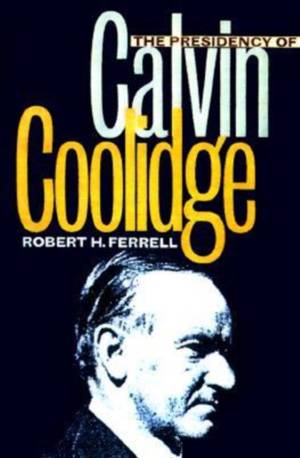
En raison d'une grêve chez bpost, votre commande pourrait être retardée. Vous avez besoin d’un livre rapidement ? Nos magasins vous accueillent à bras ouverts !
- Retrait gratuit dans votre magasin Club
- 7.000.000 titres dans notre catalogue
- Payer en toute sécurité
- Toujours un magasin près de chez vous
En raison de la grêve chez bpost, votre commande pourrait être retardée. Vous avez besoin d’un livre rapidement ? Nos magasins vous accueillent à bras ouverts !
- Retrait gratuit dans votre magasin Club
- 7.000.0000 titres dans notre catalogue
- Payer en toute sécurité
- Toujours un magasin près de chez vous
84,95 €
+ 169 points
Description
Perhaps no American president has seemed less suited to his office or his times than Calvin Coolidge. The taciturn New Englander became a vice presidential candidate by chance, then with the death of Warren G. Harding was thrust into the White House to preside dourly over the Roaring Twenties. Robert Ferrell, one of America's most distinguished historians, offers the first book-length account of the Coolidge presidency in thirty years, drawing on the recently opened papers of White House physician Joel T. Boone to provide a more personal appraisal of the thirtieth president than has previously been possible. Ferrell shows Coolidge to have been a hard-working, sensitive individual who was a canny politician and a clever judge of people. He reveals how after being dubbed the "odd little man from Vermont" by the press, Coolidge cultivated that image in order to win the 1924 election. Alas, Coolidge's long-suffering wife often had to serve as a safety valve for his temper. Ferrell's analysis of the Coolidge years shows how the President represented the essence of 1920s Republicanism. A believer in laissez-faire economics and the separation of powers, he was committed to small government, and he and his predecessors reduced the national debt by a third. More a manager than a leader, he coped successfully with the Teapot Dome scandal and crises in Mexico, Nicaragua, and China, but ignored an overheating economy. Ferrell makes a persuasive case for not blaming Coolidge for the failures of his party's foreign policy; he does maintain that the President should have warned Wall Street about the dangers of overspeculating but lacked sufficient knowledge of economics to do so. Drawing on the most recent literature on the Coolidge era, Ferrell has constructed a meticulous and highly readable account of the President's domestic and foreign policy. His book illuminates this pre-Depression administration for historians and reveals to general readers a President who was stern in temperament and dedicated to public service.
Spécifications
Parties prenantes
- Auteur(s) :
- Editeur:
Contenu
- Nombre de pages :
- 260
- Langue:
- Anglais
- Collection :
Caractéristiques
- EAN:
- 9780700608928
- Date de parution :
- 29-06-98
- Format:
- Livre relié
- Format numérique:
- Genaaid
- Dimensions :
- 162 mm x 237 mm
- Poids :
- 635 g

Les avis
Nous publions uniquement les avis qui respectent les conditions requises. Consultez nos conditions pour les avis.






